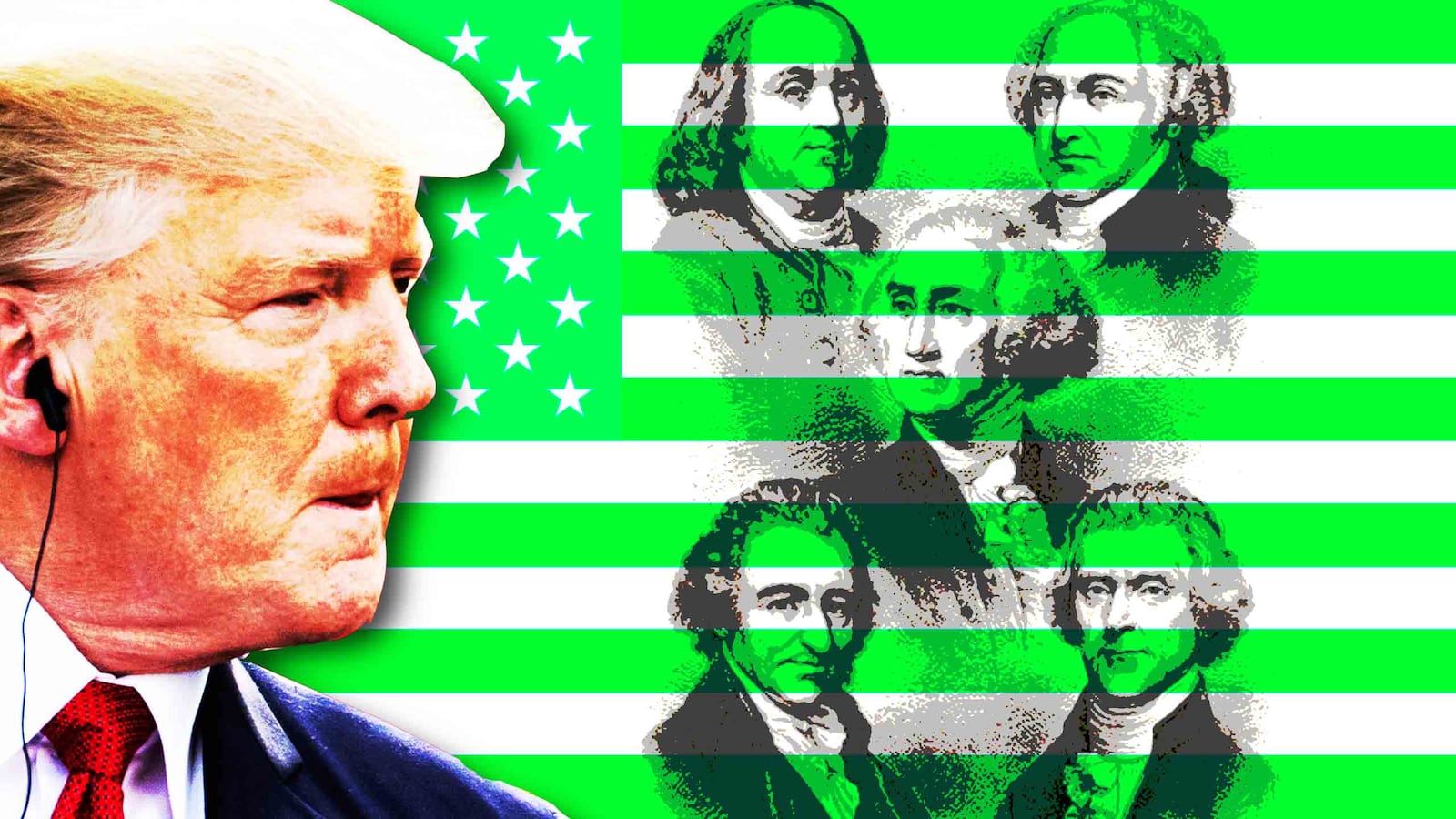The Founders had a major fear for the future of the American republic: that it would collapse into tyranny.
Some day a leader would win an election for president and then use the power and resources available to him as chief executive to disembowel democracy to the point of transforming it into an autocracy. And they knew just what sort of character would do that: a flamboyant charlatan who lied at every turn, used those lies to channel resentments at the status quo into votes that sent him into office, and then did not scruple to abuse his new power to amass even more power. In short, they feared the election of a Donald Trump.
They knew a lot about tyrants. They had worked very hard to get out from under one, King George III of Great Britain. Since 1760, when he ascended to the throne, they had watched in horror as Great Britain’s limited monarchy and Parliamentary democracy, once revered as the best government in the world, slid into practices that history taught prepared the way for tyranny. Benjamin Franklin identified these in 1775 when he wrote home from London about the “extream Corruption prevalent among all Orders of Men in this old rotten State [and the] Numberless and needless Places, enormous Salaries, Pensions, Perquisites, Bribes, groundless Quarrels, foolish Expeditions, false Accompts or no Accompts, Contracts and Jobbs [that] devour all Revenue and produce continual Necessity in the Midst of natural Plenty.”
The Declaration of Independence featured the Founders’ long list of George III’s crimes against America, “a history of repeated injuries and usurpations, all having in direct object the establishment of an absolute Tyranny over these States.” Particularly galling was his “transporting large Armies of Foreign Mercenaries to compleat the works of death, desolation, and tyranny,” an action “totally unworthy of the Head of a civilized nation.” For George Washington, the hiring of the mercenaries was the final piece of evidence that George III had become a despot. Franklin, in designing a Great Seal for the new country, chose a biblical scene with the motto, “Rebellion to Tyrants is Obedience to God.”
The Founders knew a lot about past tyrants, from reading about those of ancient Greece and Rome, a knowledge reinforced by the 1776 publication of the first volume of Edward Gibbon’s Decline and Fall of the Roman Empire, with its vivid examples of the failure and decadence of tyrants. It was further ratified by revivals of Joseph Addison’s Cato, A tragedy, about the Roman senator’s heroic resistance to the tyranny of Caesar. Washington is believed to have allowed the play to be presented to the troops at Valley Forge, to reinvigorate their motivation to fight on.
John Adams, Thomas Jefferson, James Madison, Alexander Hamilton and other Founders deeply researched past republics—what had been their good and bad parts, procedures, and policies, and identified two ways in which republics died.
The first was the tyranny of the majority, in which a majority, often led by a rabble-rouser, enforced its wishes on various minorities and made them subservient—Alexis de Tocqueville would later warn that this was the greatest danger inherent in American democracy. The second death was tyranny at the hand of someone initially selected by popular vote, who then seized enough power to rule alone, with little or no reference to either the majority or the minorities.
For Madison, these two tyrannies were the same; as he wrote in the 47th letter of The Federalist Papers, “The accumulation of all powers, legislative, executive, and judiciary, in the same hands, whether of one or a few, or many, and whether hereditary, self-appointed or elective, may justly be pronounced the very definition of tyranny.”
In constructing the Constitution, Madison, Hamilton, lawyer James Wilson and their colleagues were acutely conscious of how easily the people could be led, and led astray, as had recently happened in Shays’ Rebellion, put down just prior to the Constitutional Convention. They had also witnessed first-hand the failure of Pennsylvania’s Constitution of 1776, under which a too-active legislature, a weak chief executive, and a supine judiciary had accelerated the state’s descent into economic and civic chaos.
While Hamilton was all for a very powerful chief executive, possibly appointed for life, because he (and everyone else) knew that the fair-minded George Washington was going to become the first president—Washington had already refused the opportunity to become a king—Madison resisted pressure for a very powerful president just as strongly as he did efforts to create a dominant legislature, citing the bad example of Pennsylvania.
Delegate Patrick Henry, who had helped to ignite the Revolution with his line, “Give me liberty or give me death,” objected to the proposed Constitution because it gave too much power to a president, warning that history showed that individual liberties were often lost through “the tyranny of rulers.” Madison answered him directly on the Convention floor, insisting that liberties were more frequently lost by “gradual and silent encroachments of those in power.”
The only way to guarantee the preservation of the republic and to prevent tyranny, the Constitution writers finally agreed, was through having separate legislative, executive, and judicial branches, and by embedding in the Constitution powers that enabled each to exert “checks and balances” on the others. Washington agreed, writing to Lafayette that under the new system America “can never be in danger of degenerating into a monarchy, an Oligarchy, an Aristocracy, so long as there shall remain any virtue in the body of the People.” He added that the Constitution had “more checks and barriers against the introduction of Tyranny… than any government instituted among mortals,” but that, given human nature, it was nonetheless a gamble.
Hamilton was even more explicit in Federalist 51, “Ambition must be made to counteract ambition. The interest of the man must be connected with the constitutional rights of the place. It may be a reflection on human nature, that such devices should be necessary to control the abuses of government. But what is government itself, but the greatest of all reflections on human nature? If men were angels, no government would be necessary.”
In short, the Founders knew that if the checks and balances proved to be not strong enough to restrain the executive, or if the legislative and judicial branches, convinced by a crisis, yielded too much power to the executive—well, that way lay tyranny, because a president would then be able to do whatever he pleased, even if in the process he destroyed the republic.
So they were grateful that as chief executive they would have a Washington, not some lesser, mere grasping mortal who every day in office would show to the world an increasing inability to resist the thrill of wielding ever more power while displaying all the signs of becoming a tyrant.






